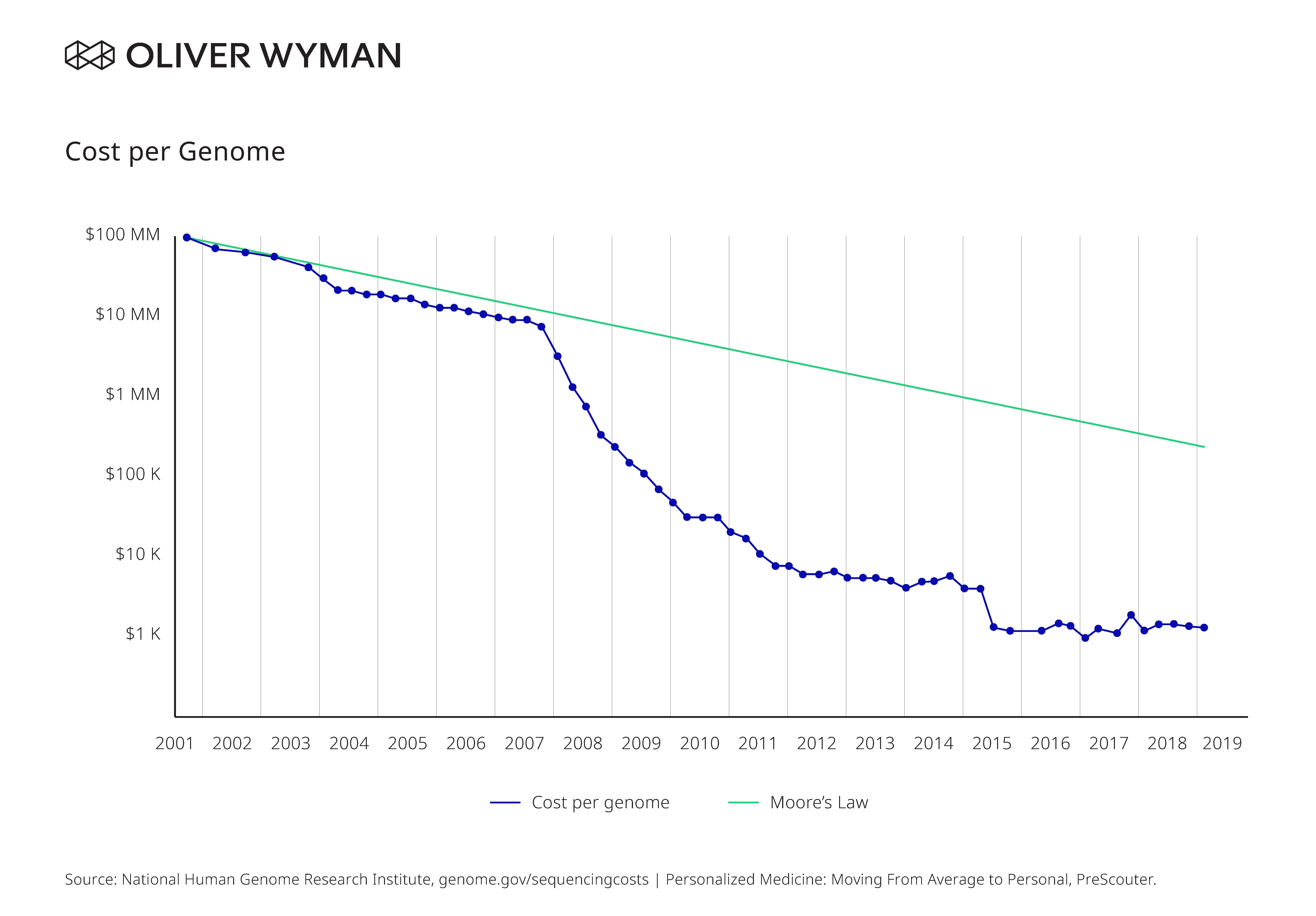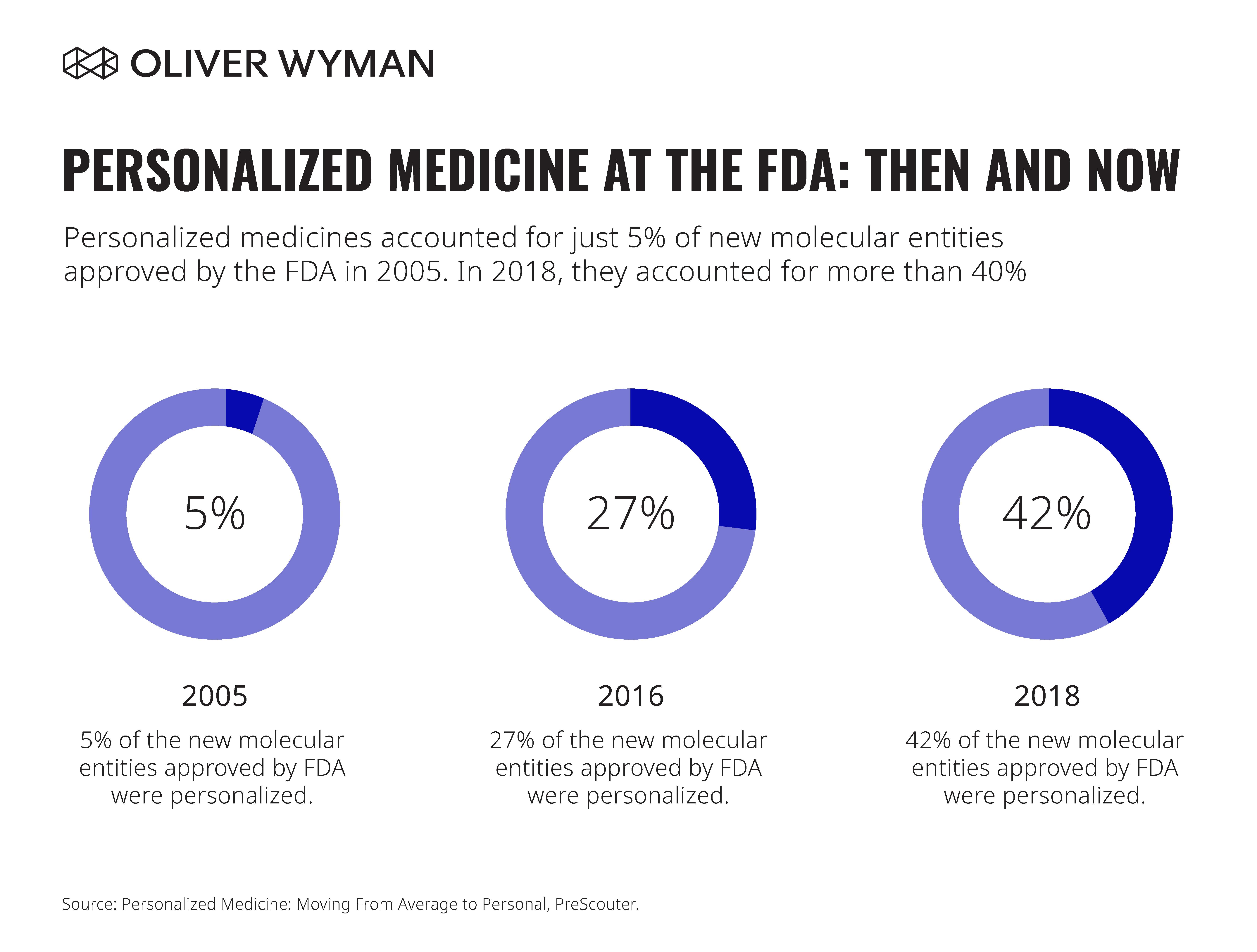Editor's Note: This article was originally published in Brink.
The idea that we all could lead healthier, longer lives with the advent of personalized healthcare is a testament to the ingenuity and evolution of medicine. That being said, cost, regulations, and ethical issues are some of the main challenges still to overcome.
Disrupting the Drug Manufacturing Process
According to a recent white paper by PreScouter, Personalized Medicine: Moving From Average to Personal, personalized medicine will not only change the way patients are diagnosed and treated, but it will also disrupt current drug manufacturing protocols.
Large-batch production may become a thing of the past, and that’s not necessarily a bad thing. Single-use technologies that produce small batches of drugs are safe and effective and don’t have the financial burden of fixed capital investments and constant equipment upkeep.
On the other hand, individualized drug therapies will disrupt many of the automated processes that have been tested and validated under quality control requirements.
This could mean a shift in manufacturing to manual labor, which would require new production facilities and altered supply-chain logistics. Many current personalized treatments involve manufacturing products using a patient’s own cells. For example, chimeric antigen receptor (CAR) T-cell therapy necessitates the extraction of a patient’s T-cells, genetic reprogramming of those T-cells so they can fight cancer cells and reinfusion back into the patient.
This type of therapy is a far cry from the “simple” manufacturing of a drug in-house and exporting it to facilities that directly market to patients. Instead, it is a complex arrangement of appropriate shipping conditions, quality control, and safety requirements. And this is all for a single patient. How personalized medicine will ultimately affect manufacturing and distribution is unclear, but the industry will need to adapt to fulfill individualized production needs.
How Will Personalized Medicine Affect Healthcare Costs?
Personalized medicine’s effect on healthcare costs is also not clear. It seems likely that specialized treatments made for individuals or small groups of people would increase costs because everyone would require individualized drug production.
On the flip side, genomic sequencing, which creates a roadmap for precision treatment decisions, is not as costly as it was 15 years ago and informed drug targeting could reduce the overall cost of healthcare by addressing the underlying causes immediately. Perhaps it will be most interesting to observe how insurance companies react to this treatment paradigm shift.
Historically, health insurance companies have taken a conservative approach to coverage of genetic testing, which at this point is the primary foundation for identifying individual treatment strategies.
To circumvent this problem, US lawmakers on both sides of the aisle are drafting legislation like the Advancing Access to Precision Medicine Act, which would allow states to apply for exceptions to the federal medical assistance percentage rate to cover whole genome sequencing clinical services for children whose diseases may have an underlying genetic component.
Rise in FDA Approval for Personalized Medicine
Genetic and genomic sequencing companies are also doing their part in making personalized medicine more palatable to insurance companies by offering to pick up part of the tab.
Under a contract between Harvard Pilgrim Health Care and Illumina, Harvard Pilgrim will cover — to a predetermined limit — prenatal genetic testing for women under the age of 35 with average-risk pregnancies, while Illumina, a next-generation genetic testing company, will cover the remaining cost. Partnerships like this may show the utility of genetic testing while potentially reducing the financial burden of lifelong healthcare for improperly diagnosed and treated conditions.
The number of approved personalized medicines has increased dramatically since 2005. This consists of both conventional modalities as well as novel approaches; for example, in 2017, the United States Food and Drug Administration (FDA) approved the use of CAR T-cell therapy to treat B-cell lymphoma. Despite this rise in approval, some challenges to regulation have arisen.
Ethical Considerations and Dynamic Consent
Personalized medicine is possible thanks to the thousands of people who have essentially donated their medical information. Much of the data now stored in biobanks and used to make informed treatment decisions were gathered when personalized medicine was naught but a thought. Potential ethical issues of using this data, where informed consent was given at a time when precision medicine was inconceivable, have been resolved. The language of consent forms was broad and therefore ruled inclusive for modern research questions.
In an age of data compiling and sharing across the academic, industry and healthcare settings, the most important considerations are patient confidentiality, protection and ownership of information, and proper disposal of materials.
While interdisciplinary collaboration is great for innovation and discovery, it can also confuse the proper channels for information and sample handling. To get a handle on this, patients now have the power to control their information. Dynamic consent requires communication between the patient and the user of the patient’s information when the user plans to apply the data to a new project. The patient can deny or allow consent at any point and will always be informed of the manner in which their information is to be used.
But dynamic consent is neither widespread nor a requirement across all biobanks. Overall, there is a lack of consistency in consent requirements and perhaps a need for more strict and pervasive health data protection legislation.
Playing Catch-Up
As is the case with most scientific advancements, the regulatory, social and economic facets must play catch-up with the technology. Clear and transparent processes and communication will be necessary to ensure that personalized medicine is practiced efficiently and effectively. With the power to address unmet medical needs at the individual level, universal personalized medicine is the goal.





